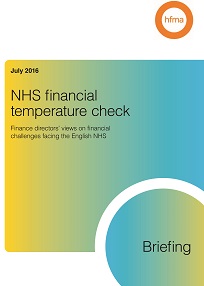News / Risk assessment
 NHS finance directors and chief finance officers are reporting the most challengingcontracting round they have experienced, and have raised major concerns about their ability to deliver financial plans in 2016/17.
NHS finance directors and chief finance officers are reporting the most challengingcontracting round they have experienced, and have raised major concerns about their ability to deliver financial plans in 2016/17.
The HFMA’s latest NHS financial temperature check pulls together reported financial information with a detailed finance director survey undertaken at the end of May and early June. The report summarises the out-turn position for 2015/16, in which providers reported a £2.45bn deficit – three times larger than in 2014/15 – and clinical commissioning groups overspent by £16m compared with planned levels.
The current year was supposed to see the NHS provider sector return to overall balance on the back of a targeted £1.8bn of sustainability and transformation funding. Providers have been asked to agree to centrally set control totals as a precondition to accessing the additional funding.
In the HFMA sample, some 63% of trusts had signed up to their control totals. However, of these organisations, only 60% expect their organisation to meet the conditions set.
NHS Improvement reported that 157 trusts out of 240 (65%) reported a deficit in 2015/16. However, in the 105 trusts in the Temperature check sample, only 70% of those reporting a surplus or breakeven in 2015/16 expect to repeat the feat. And among trusts making a deficit in 2015/16, only 39% expect to return to a positive financial outturn. The sample is not completely reflective of the surplus-deficit split across the sector in 2015/16, but it does not look like the major turnaround in providers’ financial positions that was being planned.
This chimes with recent confirmation from NHS Improvement that the aggregate planned provider deficit currently sits at about £550m. This has been driven by a worsening of providers’ financial position in the last few months of 2015/16, beyond the £1.8bn originally set as a maximum deficit. It also reflects the fact that the £2.45bn deficit was only achieved using ‘financial improvement opportunities’ including capital-to-revenue transfers and one-off technical measures.
The feedback is that this has been the most challenging contracting round that finance directors have experienced. Service affordability and protracted negotiations about reducing activity levels and QIPP savings were the main issues. Two-thirds of CCGs and nearly half of trust respondents reported a high degree of risk associated with achieving their organisations’ 2016/17 financial plan. Just 3% of finance directors were confident in their plans enough to label them as low risk.
There were no surprises in what finance leaders saw as the main risks. In providers, these included (in order) slippages in cost-saving programmes, agency staff spending and the knock-on impact of social care financial constraints as well as increased demand.
For CCGs, the most widely flagged risk was from funding increases in emergency care activity. But continuing healthcare, rising demand in general and slippage in cost savings were also regularly highlighted.
Achievement of savings is clearly crucial to achievement of overall plans. In 2015/16 commissioners delivered £1.9bn of a planned £2.2bn of QIPP savings. Providers similarly fell short of planned levels, with their aggregate £2.9bn of savings failing to meet the planned level in cost improvement programmes by £316m. Providers had planned for 92% of these savings to be from recurrent schemes, but in fact recurrent savings accounted for less than 80% of all savings.
Keeping a post vacant might deliver a non-recurrent saving, eliminating the position would make the saving recurrent. Failing to deliver recurrent savings makes subsequent years’ saving programmes even harder to achieve as their underlying financial position is worse than reported.
Trusts’ and CCGs’ savings plans ranged from a modest 1% to a more eye-watering 9% as a percentage of turnover or resource limit, although 63% of trusts and 68% of CCGs had savings plans in the range of 2.5% to 4.5%.
Respondents had more confidence in being able to deliver non-recurrent savings than planned recurrent savings. Nearly 80% of trust directors said they were confident of delivering their planned non-recurrent savings – a slightly higher level than CCG directors. But this falls to 39% and 33% respectively for recurrent savings – raising concerns about the ability to achieve control totals and required financial positions.
Transformation remains the main perceived solution to at least meeting some of the current service and financial challenges. CCGs are planning closer integration or redesign of pathways and eliminating unwarranted clinical variation – raising quality and reducing waste.
Primary care investment is also a big priority for many commissioners – again moving investment to earlier in the pathway or even to prevention and supported self-management models. Transformation is also on trusts’ agendas, but they are also looking to target agency staff costs, improve procurement value and rationalise estates.

The impact of financial challenges on the quality of services is difficult to analyse. Defined in terms of key measured access targets, there have been undeniable dips in performance. In May, NHS Improvement reported that ‘the sector as a whole continued to underperform against a number of national healthcare standards’. In aggregate, providers missed the 95% four-hour target in accident and emergency and the 92% referral to treatment target. They also failed to meet the 85% 62-day urgent cancer referral to treatment target in each quarter.
In reality, quality is a more rounded issue, taking account of access, outcomes and patient experience – and the Temperature check has always used this broader definition when examining quality of services. In previous surveys, finance directors have given a relatively rose-tinted view of quality. Last November’s report, for example, found that 88% of finance directors did not expect service quality to reduce in 2015/16, while just 9% of directors thought quality would actually deteriorate.
However, the latest survey finds pessimism on the increase, with 21% of CCG chief finance officers and 23% of trust finance directors expecting a deterioration in quality in 2016/17. A third of trust directors believe quality will be hit in 2017/18.
Drilling a bit deeper, the survey found that directors see waiting times, access and the range of services offered as the most vulnerable as a result of financial pressures.
But patient safety was considered the least likely area to be affected.
The Temperature check also looked at the sustainability and transformation planning process, with the requirement to produce plans having been introduced since the last survey. There was broad support for planning across areas, with the process seen as providing benefits for collaboration and the reshaping of services.
However, there were some concerns about the governance arrangements for large ‘footprints’ (44 in total). There were also concerns that pressure on individual organisations to meet their own financial targets under pressure from regulators might take precedence over partnership aims.
There was further concern that the pressure for such a fast pace of change might place a strain on newly forming relationships. And only 35% of respondents thought the relationships between commissioners and trusts in their footprint were strong enough to deliver the required cross-organisational changes.
Even those with a good track record of collaboration felt the challenge was substantial. Most respondents (71%) believed it was too early to say whether the new plans would result in a fair sharing of financial risk between the organisations in their footprint. Just 16% of directors in the sample declared themselves very or quite confident that the organisations in their footprint could deliver a connected strategic plan for the period up to 2021.
There was almost unanimous backing for transformation of services in organisations and across areas. Many areas are already working on this, but directors highlighted the difficulty of taking this agenda forward while also maintaining business-as-usual and delivering on-going cost improvement programmes.
There is also a continued question mark over the sufficiency of current NHS funding.
HFMA policy and technical director Paul Briddock said the financial position was tough and the outlook was extremely challenging. ‘There is a clear message from the finance community that it is full square behind the need to transform services and develop new models of care.
‘These are the right things to do – whatever the financial situation. Looking to support more people in the community and focus increasingly on prevention are the right approaches, but they also give us the best chance of ensuring services are sustainable.
‘But there is no financial headroom – as can be seen by the £2.45bn deficit recorded by providers in 2015/16. And finance directors are clear that they see significant risks in the plans they are looking to deliver in 2015/16.
‘There are also increasing concerns about the impact on service quality and how quickly the sustainability and transformation plans are expected to deliver more integrated services.’
Related content
The Institute’s annual costing conference provides the NHS with the latest developments and guidance in NHS costing.
The value masterclass shares examples of organisations and systems that have pursued a value-driven approach and the results they have achieved.